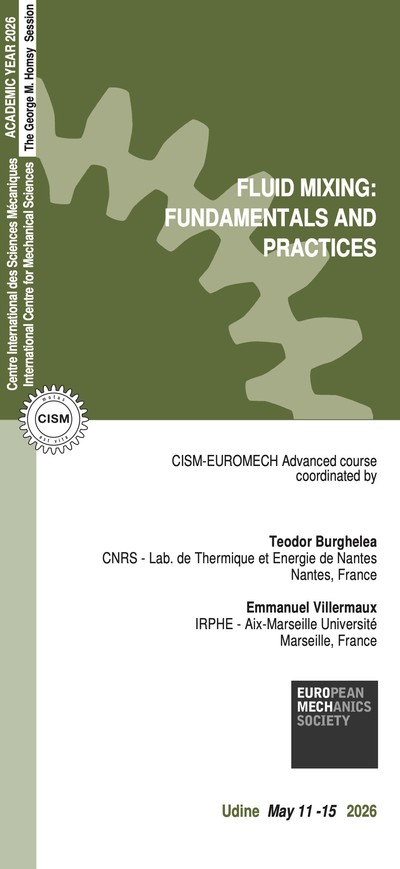Advanced materials (e.g., composites) are subject to stresses and strains at the microscopic, mesoscopic, and macroscopic level. This extends to components, especially if manufactured with complex methods, such as additive manufacturing. The determination of mechanical properties of such materials and of the life duration of such components is particularly important, but also extremely challenging, in view of their microstructural complexity. Typical examples are composite materials (especially multi-phase) and functional materials such as those for filter applications. For components it is of great interest to determine (and possibly measure) internal stresses in a non-destructive manner, in order to connect the internal stresses with their performance and lifetime.
One aspect of relevance is the multi-scale character of the problem. For example, in composite materials internal stresses do not only appear at macro level (due to machining, heat treatments, operating conditions, etc.) but also at micro-level, i.e., among the different constituent phases. Those stresses are a consequence of the microstructure; they also evolve under applied loads (thermal, mechanical chemical, etc.), and need to be monitored. Diffraction methods are particularly suited to tackle the non-destructive determination of internal stresses, and micromechanical methods are available to calculate them analytically. Both methods can cast further light onto the mechanisms of load partition among the different constituents.
The present course is targeted at systematically rationalizing the experimental and theoretical aspects of stress analysis in complex materials such as multi-phase composites (thereby including pores as a phase).
Classic experimental determination of mechanical and thermal properties through uniaxial, bending, instrumented indentation tests, impulse excitation, and thermal conductivity will also be treated. It will be shown how thermal properties are connected to mechanical behavior, and which additional information they can yield, especially under the light of the so-called cross property connections in materials.
Several micromechanical schemes will be treated, and advanced applications of those micromechanical methods will be made by calculation of stress partition in multiphase materials and non-linearity in porous ceramics and rocks, as well as by determination of equivalent elastic constants in multi-phase materials.
In parallel, different numerical approaches will be covered, the main emphasis being put on Finite Element based methods, with special attention being given to issues connected to evaluating local stress and strain fields.
Both analytical and numerical methods will be merged into the so-called Inverse Analysis (IA), which aims at extracting information from experimental data through simulation and modeling (i.e. minimization of discrepancy between experimentally measured quantities and their computed counterpart).
It will be pointed out how models give a framework to assess quantities that are not directly measurable within the experiment by measuring something else, which is more accessible.
The target audience are mainly Mechanical Engineers and Materials Scientists, but Physicists and Geologists may well use the material dealt with.
G. S. Schajer (ed.), Practical Residual Stress Measurement Methods, Wiley, 2013.
V. Hauk., Structural and Residual Stress Analysis by Nondestructive Methods, Elsevier, 1997.
V. Buljak, Inverse Analysis with Model Reduction - Proper Orthogonal Decomposition in Structural Mechanics, Springer-Verlag, ISBN 978-3-642-22702-8, 2012.
M. Jirasek and Z. Bazant, Inelastic Analysis of Structures, Wiley, ISBN: 978-0-471-98716-1, 2001.
M. Kachanov and I. Sevostianov, Micromechanics of Materials with Applications. Springer, 2018.
S.Torquato, Random Heterogeneous Materials, Springer, 2002.
M. Bornert, T. Bretheau and P. Gilormini, Homogénéisation en mécanique des matériaux, parts 1 and 2, Hermes, 2001.
6 lectures on: Application of numerical methods to continuum micromechanics; Volume elements, boundary conditions and modeling strategies; Evaluation of microfields and macroscopic responses of inhomogenous materials.
6 lectures on: Introduction to residual stresses; Determination of residual and internal stress by diffraction methods; Case studies of stress determination by diffraction.
6 lectures on: Constitutive modeling as framework for description of material mechanical behavior; Extraction of information: Inverse problems and their applications; Instrumented indentation testing.
6 lectures on: Mechanical testing, measurement of thermal properties; Effective mechanical and physical properties. Microstructure dependence on technology. Examples.
6 lectures on: Introduction to tensors; Eshelby problems; Calculation of residual stresses in heterogeneous materials; Homogenization schemes in composite materials.
The registration fee is 600.00 Euro + VAT*, where applicable (bank charges are not included). The registration fee includes a complimentary bag, four fixed menu buffet lunches (on Friday upon request), hot beverages, downloadable lecture notes and wi-fi internet access.
Applicants must apply at least one month before the beginning of the course. Application forms should be sent on-line through the following web site: http://www.cism.it. A message of confirmation will be sent to accepted participants. Applicants requiring assistance with the registration should contact the secretariat at the following email address cism@cism.it.
Applicants may cancel their course registration and receive a full refund by notifying CISM Secretariat in writing (by email to cism@cism.it) no later than two weeks prior to the start of the course.
Cancellation requests received during the two weeks prior to the start of the course will be charged a 50.00 Euro handling fee. Incorrect payments are also subject to a 50.00 Euro handling fee.
A limited number of participants from universities and research centres who are not supported by their own institutions can be offered lodging and/or board, if available, in a reasonably priced hotel or student guest house.
Requests should be sent to CISM Secretariat by March 20, 2019 along with the applicant's curriculum and a letter of recommendation by the head of the department or a supervisor confirming that the institute cannot provide funding. Preference will be given to applicants from countries that sponsor CISM.
Information about travel and accommodation is available on the web site www.cism.it, or can be mailed upon request.
* Italian VAT is 22%.





